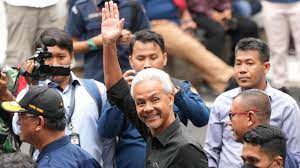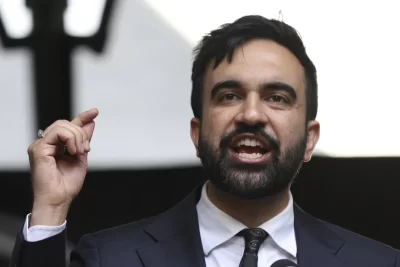
Indonesia’s three presidential hopefuls vowed a peaceful race on Monday, a day before campaigning for next year’s election officially began as concerns rose their rivalry may sharpen religious and ethnic divides in Southeast Asia’s largest democracy.
The election, due in February, will determine who will succeed President Joko Widodo, serving his second and final term.
Hundreds cheered as the presidential and vice presidential candidates arrived at the General Election Commission compound in central Jakarta. Students from state-owned institutions held a parade with a colorful marching band.
The election is shaping up to be a three-way race between the current defense minister Prabowo Subianto and two former governors, Anies Baswedan and Ganjar Pranowo. If none of the candidates secures more than 50% of the votes in the first round, a runoff between the top two is scheduled for June 26.
The three vowed to hold an amicable 75-day election campaign “without … politicizing ethnicity, religion and race, and without,” nor using bribes to sway the vote.
Opinion polls forecast a close race between Subianto and Pranowo, while Baswedan is consistently in third place.
Subianto, 72, a former army commander who was dishonorably discharged in 1998 on kidnapping and allegation charges, ran unsuccessfully against Widodo in the past two elections, marred by dirty campaigning. He went into self-exile in Jordan before returning and founding the Gerindra Party in early 2008. He was never court-martialed.
In the past, he had close ties with hard-line Islamists who he used to undermine his opponents. In 2019, Widodo offered him the defense minister position in a bid for unity.
In the coming elections, Subianto picked Widodo’s eldest son Gibran Rakabuming Raka as his running mate. He also vowed to continue the current president’s development plan, in what the experts view as an attempt to draw on Widodo’s popularity, which Kompas — Indonesia’s reputable pollster — cemented in a report in May saying he still has a 70% public trust rating after two terms of ruling. While the latest opinion polls by Indikator Politik Indonesia said Widodo had 75.8% support.
Subianto’s main rival, Pranowo, is the governing party’s presidential candidate and former governor of Central Java. His vice presidential candidate is top security minister Mohammad Mahfud.
Pranowo was a national legislator for the governing Indonesian Democratic Party of Struggle, or PDIP, for 10 years before being elected in 2013 for the first of his two terms as Central Java governor.
He faced backlash from soccer fans after FIFA earlier this year stripped Indonesia of its right to host the Under-20 World Cup following his criticism of Israeli participation in the tournament.
Indonesia is the world’s most populous Muslim-majority nation and does not have diplomatic relations with Israel.
The final presidential contender is former education and culture minister Baswedan, known as a progressive Muslim intellectual, but religious identity politics in the 2017 election for Jakarta governor were seen as distancing him from moderate Muslims.
Backed by conservative Muslim groups, he galvanized hundreds of thousands to take to the streets in 2016 against the ethnic Chinese Christian governor, Basuki Tjahaja Purnama, who was then imprisoned on blasphemy charges after quoting the Quran in a speech. He was seen as using the controversy to successfully run for governor.
Baswedan’s running mate is Muhaimin Iskandar from the PKB party, which has strong ties with Indonesia’s largest Islamic organization, Nahdlatul Ulama, and boasts over 45 million members. Choosing Iskandar is seen by experts as a way to capitalize on the support of moderate Muslims.
Indonesia, with a diverse population of more than 270 million, is the world’s third-largest democracy after India and the U.S.




